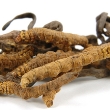
The new HBO show “The Last of Us” is stirring up interest in a fungus parasite called cordyceps. You might be surprised to learn that it’s a sought-after ingredient in traditional Chinese medicine – and most cordyceps products on the market are actually made in a lab. So what is it exactly? And why would anyone want to take this “zombie” fungus?
Wild cordyceps lives on caterpillars and other insects in high mountain regions of China – it’s sometimes called Chinese caterpillar fungus. In order to grow, it attaches to a host, such as a caterpillar. Then the mycelia, or fungus root structure, spread throughout the host’s body. The fungus eventually takes over and replaces the host tissue completely.
In contrast to what’s depicted in the new HBO show, cordyceps is actually difficult to find in the wild. And because supply is so limited, wild cordyceps is very expensive. The cordyceps found in dietary supplements is artificially grown in a lab – the active chemicals in lab-grown cordyceps are believed to be like those found in wild cordyceps. And while it’s sometimes called a “mushroom,” only cells from the mycelia are grown in the lab – lab-grown cordyceps doesn’t produce a full mushroom.
There’s interest in using cordyceps for a variety of conditions. It might improve immunity by stimulating specific chemicals in the immune system. There’s also interest in its effects on cancer and tumor size. It’s been studied for chronic kidney disease, asthma, and many other conditions, but there’s no good scientific evidence to support any of these uses. Additionally, many cordyceps products are promoted as sports supplements, but most evidence shows that it doesn’t seem to improve athletic performance.
It’s possible that this recent buzz will impact the cordyceps product market and generate more questions from patients. We’re keeping an eye on new products as they pop up and will keep you posted on any new research. Check out our recently updated monograph to learn more.
The information in this brief report is intended for informational purposes only, and is meant to help users better understand health concerns. This information should not be interpreted as specific medical advice. Users should consult with a qualified healthcare provider for specific questions regarding therapies, diagnosis and/or health conditions, prior to making therapeutic decisions. Copyright © 2025 NatMed. Commercial distribution or reproduction prohibited. NatMed is the leading provider of high-quality, evidence-based, clinically-relevant information on natural medicine, dietary supplements, herbs, vitamins, minerals, functional foods, diets, complementary practices, CAM modalities, exercises and medical conditions. Monograph sections include interactions with herbs, drugs, foods and labs, contraindications, depletions, dosing, toxicology, adverse effects, pregnancy and lactation data, synonyms, safety and effectiveness.
